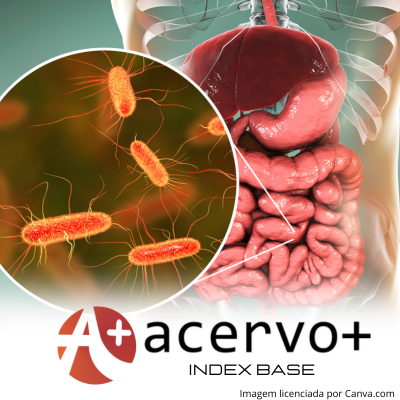Microbioma intestinal: influência na saúde infantil e potencial de novas intervenções
##plugins.themes.bootstrap3.article.main##
Resumo
Objetivo: Avaliar o potencial das estratégias nutricionais como probióticos e prebióticos na modulação positiva do microbioma intestinal de recém-nascidos e bebês, visando promover a saúde infantil. Revisão de literatura: Probióticos reduzem citocinas pró-inflamatórias e aumentam as anti-inflamatórias, influenciando a diferenciação de linfócitos T. Combinações de Lactobacillus e Bifidobacterium reduzem mortalidade e enterocolite necrosante em prematuros. Auxiliam na restauração de filos benéficos após antibióticos. Promovem equilíbrio microecológico inicial e melhoram a barreira intestinal, reduzindo permeabilidade e resposta alérgica. Podem reduzir dias com infecções respiratórias e febre, além de episódios de regurgitação. Já os prebióticos estimulam seletivamente o crescimento de bifidobactérias, que produzem metabólitos anti-inflamatórios. Ademais, reduzem pH fecal, tornando o ambiente menos favorável a patógenos. Promovem o crescimento de bifidobactérias em recém-nascidos de cesárea. Estimulam a produção de ácidos graxos de cadeia curta, com efeitos sobre controle glicêmico, peso e saciedade. Aproxima-se a composição da microbiota de bebês alimentados com fórmula à dos amamentados. Considerações finais: Conclui-se que probióticos e prebióticos modulam positivamente o microbioma intestinal, promovendo bactérias benéficas e ações anti-inflamatórias. Isso pode ter implicações positivas no desenvolvimento do sistema imunológico infantil e na promoção da saúde.
##plugins.themes.bootstrap3.article.details##
Copyright © | Todos os direitos reservados.
A revista detém os direitos autorais exclusivos de publicação deste artigo nos termos da lei 9610/98.
Reprodução parcial
É livre o uso de partes do texto, figuras e questionário do artigo, sendo obrigatória a citação dos autores e revista.
Reprodução total
É expressamente proibida, devendo ser autorizada pela revista.
Referências
2. BENGMARK S. Gut microbiota, immune development and function. Pharmacological Research, 2013; 69(1): p. 87–113.
3. BERTELSEN RJ, et al. Use of probiotics and prebiotics in infant feeding. Best Practice & Research in Clinical Gastroenterology, 2016; 30(1): p. 39–48.
4. CARPAY NC, et al. Microbial effects of prebiotics, probiotics and synbiotics after Caesarean section or exposure to antibiotics in the first week of life: A systematic review. PLOS ONE, 2022; 17(11): p. e0277405–e0277405.
5. CHUA MC, et al. Effect of Synbiotic on the Gut Microbiota of Cesarean Delivered Infants: A Randomized, Double-blind, Multicenter Study. Journal of Pediatric Gastroenterology and Nutrition, 2017; 65(1): p. 102–106.
6. COOPER P, et al. Early benefits of a starter formula enriched in prebiotics and probiotics on the gut microbiota of healthy infants born to HIV+ mothers: a randomized double-blind controlled trial. Clinical Medicine Insights: Pediatrics, 2016; 10: p. CMPed.S40134.
7. CRISTOFORI F, et al. Anti-Inflammatory and Immunomodulatory Effects of Probiotics in Gut Inflammation: A Door to the Body. Frontiers in Immunology, 2021; 12(26).
8. GAUFIN T, et al. The importance of the microbiome in pediatrics and pediatric infectious diseases. Current Opinion in Pediatrics, 2018; 30(1): p. 117–124.
9. HAARMAN M e KNOL J. Quantitative Real-Time PCR Analysis of Fecal Lactobacillus Species in Infants Receiving a Prebiotic Infant Formula. Applied and Environmental Microbiology, 2006; 72(4): p. 2359–2365.
10. HENRICK BM, et al. Bifidobacteria-mediated immune system imprinting early in life. Cell, 2021; 184(15): p. 3884-3898.e11.
11. HILL C, et al. The International Scientific Association for Probiotics and Prebiotics consensus statement on the scope and appropriate use of the term probiotic. Nature Reviews Gastroenterology & Hepatology, 2014; 11(8): p. 506–514.
12. INDRIO F, et al. Health Effects of Infant Formula Supplemented with Probiotics or Synbiotics in Infants and Toddlers: Systematic Review with Network Meta-Analysis. Nutrients, 2022; 14(23): p. 5175.
13. JOHANSSON MA, et al. Early-Life Gut Bacteria Associate with IL-4−, IL-10− and IFN-γ Production at Two Years of Age. PLOS ONE, 2012; 7(11): p. e49315–e49315.
14. LAY C, et al. A synbiotic intervention modulates meta-omics signatures of gut redox potential and acidity in elective caesarean born infants. BMC microbiology, 2021; 21(1): p. 191.
15. LI KL, et al. Alterations of intestinal flora and the effects of probiotics in children with recurrent respiratory tract infection. World Journal of Pediatrics, 2019; 15(3): p. 255–261.
16. LIN M e YANJUN C. Research progress on the mechanism of probiotics regulating cow milk allergy in early childhood and its application in hypoallergenic infant formula. Frontiers in Nutrition, 2024; 11, p. 1254979.
17. LÓPEZ-VELÁZQUEZ G, et al. Safety of a dual potential prebiotic system from Mexican agave" Metlin® and Metlos®", incorporated to an infant formula for term newborn babies: A randomized controlled trial. Rev. Investig. Clin, 2013; 65: p. 483-490.
18. MORGAN RL, et al. Probiotics Reduce Mortality and Morbidity in Preterm, Low-Birth-Weight Infants: A Systematic Review and Network Meta-analysis of Randomized Trials. Gastroenterology, 2020; 159(2): p. 467–480.
19. NAVARRO-TAPIA E, et al. Probiotic Supplementation during the Perinatal and Infant Period: Effects on gut Dysbiosis and Disease. Nutrients,2020; 12(8): p. 2243–2243.
20. PAPAGAROUFALIS K, et al. A randomized double blind controlled safety trial evaluating d-lactic acid production in healthy infants fed a Lactobacillus reuteri-containing formula. Nutrition and Metabolic Insights, 2014; 7; p. NMI. S14113, 2014.
21. RONAN V, et al. Childhood Development and the Microbiome—The Intestinal Microbiota in Maintenance of Health and Development of Disease During Childhood Development. Gastroenterology, 2021; 160(2): p. 495–506.
22. SAAD SMI. Probióticos e prebióticos: o estado da arte. Revista Brasileira de Ciências Farmacêuticas, 2006; 42, p. 1-16.
23. SIMON E, et al. Probiotics, Prebiotics, and Synbiotics: Implications and Beneficial Effects against Irritable Bowel Syndrome. Nutrients, 2021; 13(6).
24. VERBURGT CM, et al. Nutritional Therapy Strategies in Pediatric Crohn’s Disease. Nutrients, 2021; 13(1): p. 212–212.
25. WATKINS C, et al. Microbial Therapeutics Designed for Infant Health. Frontiers in Nutrition, 2017; 4(26).
26. WEIZMAN Z. et al. Effect of a probiotic infant formula on infections in childcare centers: comparison of two probiotic agents. Pediatrics, 2005; 115(1): p. 5-9, 2005.
27. YANG I, et al. The Infant Microbiome. Nursing Research, 2016; 65(1): p. 76–88.
28. ZHONG H, et al. Impact of probiotics supplement on the gut microbiota in neonates with antibiotic exposure: an open-label single-center randomized parallel controlled study. World Journal of Pediatrics, 2021; 17(4); p. 385–393.

